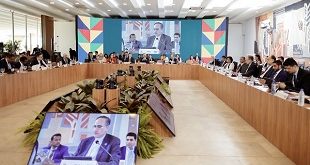
By Peter Nyanzi
Technocrats urge government to prioritize national values in long-term development plans
Permanent secretaries and other technocrats want the government to put citizens and national values at the centre of any new plans if the society is to be transformed.
The National Planning Authority (NPA) is spearheading the National Vision 2040 – an elaborate blueprint that would embody national aspirations and strategies to transform Uganda from a peasant to a modern and prosperous country within 30 years.
The ambitious plan envisages Uganda as a competitive upper middle country with per capita income of about $9,500 by 2040 up from the current $506.
But at a consultative meeting to discuss the draft plan with permanent secretaries and heads of key departments in Kampala on August 16, the technocrats were unanimous in their call for all planning activities to have human resource and national values at the centre if they are to succeed.

The government is in a hurry to complete the document such that the plan can be launched on October 9 during the Golden Jubilee celebrations, but the permanent secretaries argued that there was no need to rush because more consultations are still needed so as to make a thorough document.
Edith Mwanje, the PS in the ministry of East African Community Affairs, led the chorus of voices calling for more focus on inculcating personal and national values in the population if society is to be transformed.
“There is a need to deal with the national psyche and national values in this country,” said Mwanje, adding that a successful plan must take care of educational reforms to produce a functional human resource base. “The people are the most important resource to take us from where we are to where we want to go.”
Alex Okello Bwangamoi, the secretary of the Directorate of Ethics and Integrity, agreed, saying the human resource should be the top priority. With personal interest taking precedence over the national interest, Okello noted that the question of personal integrity was a worrying one and could derail the grandiose national plans being formulated if not addressed urgently.
The directorate has formulated a document outlining the national ethical values, which will soon be tabled before Cabinet, which if passed, could go a long way towards forging a transparent and honest society, according to Bwangamoi.
But Kabagambe Kaliisa, the Energy and Mineral Development PS argued that values should start with the top leadership if there is to be national transformation.
“What is our national value system and what values do we espouse as leaders?” he asked.
John Mitala, the head of the Public Service, noted that in the Asian Tigers, which Uganda wants to emulate economically, integrity is inculcated in the national ethic to the extent that people commit suicide every day for fear of shaming themselves and their family.
While the draft Vision 2040 highlights the human resource and “positive attitudes” in the Asian Tigers as one of the issues that had helped those countries to transform, the draft document is largely silent on the issue of national values and change of mindset in the populace as a component of national transformation. The technocrats said this should be addressed in line with the National Objectives as enshrined in the Constitution. They argued that one of Uganda’s main problems is that of private interest taking precedence over national and public interest, which they said had derailed national plans and programmes.
The government developed the highly-publicised Vision 2025 in the late 1990s as a national effort to transform the country economically and socially but it was later abandoned.
Matia Kasaija, the State minister for planning, attributed its demise to lack of a well-defined implementation framework.
In April 2010, the government launched the National Development Plan (NDP), a five-year policy framework for economic growth, but no diagnostic review or evaluation has been done to assess its progress, which the technocrats said was a concern.
Dr Patrick Birungi, the head of strategic planning at the NPA, said while Vision 2040 points to the huge opportunities in areas of oil and gas, tourism, minerals, mineral development, abundant youthful labour force and ICT, it would take only careful planning to harness them.
The key fundamental required to harness the opportunities for faster growth include, infrastructure, human resource, science, technology and innovations as well as peace and security. To achieve these goals, Uganda will need to multiply its GDP by 30 times and its per capita income by 20 times in the next 30 years so as to achieve the level of development observed in upper middle income countries.
Dr Kisamba Mugerwa, the NPA executive chairman, conceded that there was no need to rush the document because there is a need for more nation-wide consultations with various key stakeholders so that they own the plan.
Going forward, the technocrats noted that there is also need for the document to be harmonised with the NDP with a special focus on ICTs. Also, the government should ensure the rationalization of ministries to avoid duplication and maximise synergies and should assess the “vision-based risks” that need to be addressed. Under the theme, ‘reengineering Uganda’s development for prosperity,’ the Vision 2040 is meant to rally all Ugandans together to a “common cause”.
Kisamba Mugerwa noted that without the people’s input and prudent use of resources, any plan, however grandiose, would be wastage of time.
 The Independent Uganda: You get the Truth we Pay the Price
The Independent Uganda: You get the Truth we Pay the Price



